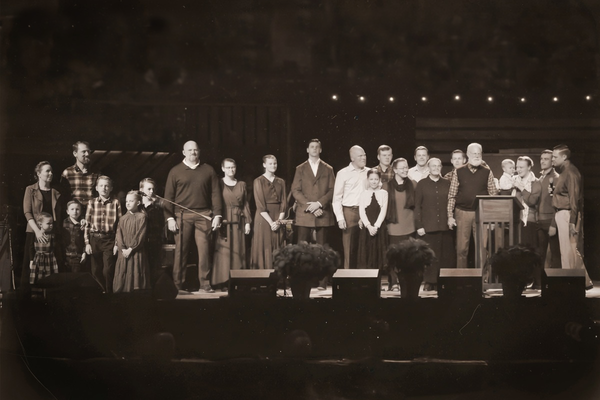Seeing God Behind the Veil
A Veil Obscuring Identity
The Bible has a fascinating story in Genesis that might puzzle modern readers. It describes Jacob falling in love with Laban’s daughter, Rachel. Laban, a wily character, convinces Jacob to work for him for seven years to marry Rachel. However, Rachel is the younger daughter, and Leah, her older sister, is upset about not getting married. Laban tricks Jacob into marrying both daughters. Jacob agrees to seven years of labor, but on his wedding night, he discovers he has married Leah instead of Rachel because Leah was wearing a veil, concealing her identity.
We’ve all seen various kinds of veils, and I think I would have recognized that it wasn’t my beloved behind the veils we’re accustomed to. This must have been a thicker weave, we might say. Jacob must not have been very fond of Leah at all because he didn’t notice her absence at the wedding. But this takes me to my point—we tend to mistake identities when a veil is involved. This brings us to what we discussed this past Sunday—the nature of God. We spoke from 2 Corinthians, where Paul says a veil lies over the hearts of God's Old Testament believers. He goes further to say that whenever the Old Testament is read, the veil lies over their hearts. Paul says the veil is only taken away in Christ when someone turns to the Spirit.
Veiling God's True Nature
Imagine having an Old Testament view of God that effectively veils Him, causing us to confuse His identity altogether. We see a God of anger and wrath instead of beholding the glory of God in the face of Jesus Christ. Having hosted a question-and-answer broadcast and numerous conferences worldwide for over three years, I can tell you that one of the most frequent questions we get is about the nature of God. People want to understand how to reconcile the God of the Old Testament, full of wrath and anger, with the God of the New Testament, full of love and mercy.
Christians have devised various ways to explain this apparent disparity. One faulty approach suggests plurality within the Godhead, where one God feels one way and another God feels another. This seems incompatible with Scripture but consistent with ancient Greek and Neoplatonic views. Yet Scripture teaches that Jesus is not merely the vivid revelation of one-third of the Godhead but the full, perfect, and final revelation of God. Scripture bluntly states: "Great is the mystery of godliness: God was manifested in the flesh, justified in the Spirit, seen by angels, preached among the Gentiles, believed on in the world, received up in glory" (1 Tim. 3:16). Similarly, John tells us, "No one has seen God at any time. The only begotten Son, who is in the bosom of the Father, He has declared Him" (John 1:18).
John implies that every other insight into God and His character is like blindness compared to the life and clarity in Jesus Christ. The writer of Hebrews tells us that "God, who at various times and in various ways spoke in time past to the fathers by the prophets, has in these last days spoken to us by His Son... who being the brightness of His glory and the express image of His person..." (Heb. 1:1-3). Paul tells the Colossians that Jesus is "the image of the invisible God, the firstborn over all creation" (Col. 1:15). These scriptures do not suggest that Jesus is the revelation of one-third of the Godhead. They describe Jesus as the full revelation and insight into God Almighty, Yahweh. Paul couldn’t be more explicit in Colossians: “It pleased the Father that in Him (Jesus) all the fullness should dwell" (Col. 1:19), and "in Him dwells all the fullness of the Godhead bodily" (Col. 2:9). He didn’t use the term Godhead to describe three different people. He said all the fullness dwelt in Jesus.
Revealing God's True Identity Through Jesus Christ
These scriptures force us toward an unavoidable conclusion. The New Testament wants us to view the ambiguity of the Old Testament through the greater revelation of Jesus Christ. We must look backward into the Old Testament through the lens of Christ and His character, words, and actions. Jesus showed His mission was to disclose the hitherto unknown Father. He said, “I do not speak on My own authority; but the Father who dwells in Me does the works” (John 14:10). When Philip asked, “Lord, show us the Father, and it is sufficient for us” (John 14:8), Jesus responded, “Have I been with you so long, and yet you have not known Me, Philip? He who has seen Me has seen the Father” (John 14:9).
From beginning to end, the Bible tells us God is a Spirit and thus invisible to human eyes. Yet when He robed Himself in human flesh and came in the humanity of Christ, we saw a perfect union between the mortal and the immortal, the human and the divine. We saw the reconciliation of what was fully God and fully human in one person, Jesus Christ. This clarifies why Paul tells us that a veil lies over people’s hearts whenever they read the Old Testament. People didn’t see God for who He was until Jesus Christ. They saw God as an angry master, which was as different from His true nature as Leah was from Rachel, because they saw God through a veil—a veil of fear, suspicion, condemnation, and distance. God wanted to rip this away and disclose His true identity through Jesus Christ.
The Crucifixion and the Nature of God
I remember a person coming to me after preaching and saying, "The way you view Jesus is confusing because you make it sound like God is who died for us on the cross." I responded, "Well, you and I both know that God is spirit and a spirit cannot die, but I'm not sure I fully embrace your suggestion that someone other than God was interceding and loving us through the cross." I then quoted Acts, where the Apostle Paul says, "Take heed to yourselves and to all the flock, among which the Holy Spirit has made you overseers, to shepherd the church of God which He purchased with His own blood" (Acts 20:28), and I asked if Paul was as nervous as they were about mistakenly imagining that it was God on the cross instead of His Son.
People speak about God as distinct from Jesus because they don't understand that Jesus was both fully divine and fully human and that He was the final, perfect, full revelation of God to us. Irenaeus once poignantly stated, "The Son is that which is visible about the Father, but the Father is that which is invisible about the Son." In this, he's showing that the Almighty, Eternal Spirit, Yahweh, our Creator, is, in fact, living in Jesus, loving through Him, speaking through Him, working through Him, and revealing Himself through Christ. He is doing this in a visible expression, using the vehicle of a human being, who is the Son of Man. This describes the humanity of Jesus. However, indwelling that human being is God, which describes the Father. This is what Jesus refers to when He says, "He who has seen Me has seen the Father" (John 14:9).
The Submission of Jesus
In fact, referring to His humanity, Jesus emphasizes His total submission. He says, "I can of Myself do nothing... I do not seek My own will but the will of the Father who sent Me" (John 5:30). He says, "The Son can do nothing of Himself" (John 5:19). He fully embraces His human dependence on the indwelling Spirit of the Father. He doesn't call it the Divine Son inside Him directing Him; He doesn't suggest that a human Son submits to a divine Son. Instead, when He refers to the Son, He means His humanity, and when He refers to the Father, He speaks of the Spirit living in Him.
We know that the Father is the Holy Spirit because when Jesus was conceived in Mary, the angel said to Joseph, "Do not be afraid to take to you Mary your wife, for that which is conceived in her is of the Holy Spirit" (Matt. 1:20). So, the Holy Spirit is the Father of Jesus because the Holy Spirit is the Father.
The Messianic Prophecies
If we go back to some of the most poignant messianic passages, such as in Isaiah, we see a full picture of who Jesus was. Isaiah 9:6 tells us, "For unto us a Child is born, unto us a Son is given; and the government will be upon His shoulder. And His name will be called Wonderful, Counselor, Mighty God, Everlasting Father, Prince of Peace." This unmistakably speaks about Jesus, telling us that a Child will be born, a Son given, and then it says this about the Child: "And the government will be upon His shoulder. And His name will be called Wonderful, Counselor, Mighty God, Everlasting Father, Prince of Peace. Of the increase of His government and peace there will be no end" (Isa. 9:6-7). Isaiah tells us that Jesus will be called the Everlasting Father and the Wonderful Counselor. This describes God in His fathering relationship and His anointing relationship through the Holy Spirit.
We see this again in Zechariah when Yahweh speaks to His people, saying, "They will look on Me whom they pierced. Yes, they will mourn for Him as one mourns for his only son” (Zech. 12:10). This undeniably refers to the sacrifice on the cross. While they look on Him as He's pierced and yet alive, Yahweh says, "You’re looking at Me, the living eternal God, the Almighty." Yet once the Spirit has parted from the flesh and the separation has occurred, prompting Jesus to say, "My God, My God, why have You forsaken Me?" (Matt. 27:46), the people are looking at a corpse. They’re looking only at the flesh, the body, and they mourn for Him. This describes the dual nature of Christ: "Me" and "Him"—"Me" being the Spirit animating and indwelling this man, and "Him" being the human vessel through which the Spirit was visible.
A Revolutionary New Community—A Shift in Understanding God
When God initiated His covenant with Abraham, He was not merely forming a relationship but launching a revolutionary new community, one with a radical departure from the societies that preceded it—the societies Abraham abandoned when he left Ur.
It is challenging for us to grasp the monumental shift in Abraham’s perception of God. Today, we are accustomed to envisioning God as embodying goodness, faithfulness, fatherhood, love, and care. However, these attributes were entirely foreign and absent in the pagan deities of Abraham’s time. Even in Islam, God is not portrayed with the nurturing, shepherding, and fathering qualities that we attribute to Him.
In Abraham's era, gods demanded obedience through fear. Their followers lived in perpetual dread, as these gods were unpredictable, capricious, and often devastating. They showed no concern for how their human followers perceived them.
Yahweh’s Revolutionary Relationship with Abraham
This is what makes Yahweh so radically different. He doesn’t seek Abraham’s obedience through fear. Instead, Yahweh wants Abraham to trust Him—to understand His nature and character, not merely as powerful, but as good, righteous, faithful, and trustworthy. Yahweh aimed not to instill fear but to foster trust in His benevolent and dependable character.
This revolutionary relationship is dramatically illustrated in the covenant ceremony between Yahweh and Abraham. Initially, the ceremony seemed conventional. In the Near East, a conquering king would often make a vassal, and a conquered ruler like Abraham would swear loyalty through such a covenant. The vassal would bring animal carcasses, cut them in half, and create an aisle between the parts. The vassal would then walk through the divided animals, signifying, “May my fate be as these animals if I break my vow.”
When Yahweh instructed Abraham to set up this scene, Abraham likely believed he knew what was expected. He arranged the animal parts and waited, fending off vultures until evening. But then, in a turn that must have astonished Abraham, Yahweh Himself, appearing as a burning lamp, passed through the animal parts.
This act was unprecedented in human religious history. Yahweh was declaring, “I am faithful. I give you My solemn word and will subject Myself to judgment if I break My promises to you.”
The Covenant Ceremony and Its Foreshadowing of Christ
Although Yahweh is the greater king in this covenant, this act illustrates that He seeks more than just Abraham's fear and submission. He desires his trust. This covenantal act is emblematic of God’s relationship with humanity throughout the Bible. He emphasizes not His power as the reason for our obedience but His goodness, faithfulness, and enduring love as the reasons for our trust, obedience, and devotion.
The covenant ceremony with Abraham foreshadows Yahweh’s ultimate act of faithfulness in the life of Jesus Christ. Through Jesus’ death, God takes upon Himself the consequences of our covenantal unfaithfulness, renewing the covenant of trust and establishing a foundation of love and grace.
The Unchanging Nature of Yahweh
The name Yahweh is the given name of God, disclosed to Moses in their exchange in Exodus 3; it means "I AM WHO I AM." Yahweh is unchanging in His integrity, consistency, and identity. Still, in His revelation to mankind, He is constantly unfolding more—more power, grace, love, and more of what we need to rediscover union with Him. Down through the ages, Yahweh identifies Himself in terms of all the things He becomes to facilitate mankind's relationship with Him. He calls Himself El Shaddai, "God Almighty," the provider; Yahweh Tsidkenu, "The Lord our Righteousness"; Yahweh Shalom, "The Lord our Peace"; Yahweh Rapha, "The Lord our Healer"; Yahweh Nissi, "The Lord our Banner"; Yahweh Rohi, "The Lord our Shepherd"; Yahweh Jireh, "The Lord will Provide"; Yahweh Shammah, "The Lord is There"; and Yahweh Sabaoth, "The Lord of Hosts." Throughout the ages, God has shown Himself in these unfolding revelations of grace to His people. He is Yahweh, and He changes not, but He constantly reveals more of His unchanging self to His people.
When the angel foretells the birth of Jesus to Mary, he says, "You shall call His name JESUS, for He will save His people from their sins" (Matt. 1:21). This name, Yeshua, is “Joshua” if translated directly from the Hebrew to the English, instead of via the Greek. It would have been the same name describing Moses’ successor and also the high priest at the time of the second temple. This name Joshua, or Yeshua, combines "Yah," which is an abbreviation of Yahweh, and "Hosea," meaning salvation. Using “Yah” to refer to “Yahweh” is typical throughout the Old Testament. We still use this today when we say "Hallelu-Yah," which means "Praise be to Yahweh." The psalmists use this term repeatedly: "Praise be to Yah," "Sing unto Yah," and so on.
The Fulfillment of Salvation
So, at the birth of Jesus, God is saying, "Call His name Yeshua—Yahweh becomes salvation—for now I am becoming salvation. I have become everything you needed until now, and now, the final act, I am becoming your atonement, reconciliation, forgiveness, power, and mercy." In the life of Jesus, we see all these facets of salvation unfold in and through Him. He becomes like us. He becomes an example. He becomes a conduit of grace and power through miracles of mercy. He becomes our teacher. He becomes our lawgiver, fulfilling the law in so doing. And at last, He becomes our sacrifice. He becomes our high priest, making the sacrifice, and He becomes our temple, and He becomes the God to whom the sacrifice is made. In the outpouring of His Spirit, we’re told that "the last Adam became a life-giving spirit" (1 Cor. 15:45). His final expression is to become the indwelling reality of the Father in the church in like measure, in like kind, as the Father dwelt in Jesus—though in the Son, He dwelt without measure, and in each of us, we have but a measure.
What we are supposed to see on the cross is not the kindness of one person of the Godhead and the anger of another. Instead, we’re supposed to see the Father paying the debt to His own word and justice and fully manifesting His love, kindness, and redemption to us. It’s human theology that has confused this. Still, in the second epistle to the Corinthians, the Apostle Paul writes, “God was in Christ reconciling the world to Himself” (2 Cor. 5:19). The Father was in Christ doing the reconciling. He didn't give His only begotten Son because He was angry with us. He gave His only begotten Son the humanity He was living in because He so loved us: "For God so loved the world that He gave His only begotten Son" (John 3:16).
The Tearing of the Veil
What happens when Jesus is on the cross, and He experiences that agony, and the Father is in Him reaching us through the sacrifice? What happens? From the Garden of Eden to the Tabernacle of Moses and the temples of Solomon and Herod, the holiest place was always protected from human access. From the Garden of Eden, the angels protected us from the Spirit of God that we used to know before the fall. In the tabernacle, there was a thick, six-inch veil that was impenetrable. On the other side of that veil was glory; on the other side of that veil was the mercy seat, the throne of God where the presence of God dwelt, the Bible tells us. Only one priest could enter once a year. Around the ankle of that priest, they would tie a rope so that if he died, they could drag him out without having to enter because we were so fearful, so condemned, so filthy, that we were not able to enter that presence without scaring Him away or killing ourselves in the process.
But what happened at the cross? At the cross, the debt to justice was paid. The ordinance against us was satisfied. The hell and separation from God that we deserved was fully absorbed in Christ in His unjust death on the cross on our behalf. Instantly, something stupendous occurred. It’s not a coincidence. We are told that the veil of the temple that shielded the glory of God from the people was torn from top to bottom (Matt. 27:51), as if God Himself were taking the curtain that hid people from His true identity and ripping it, exposing the glory of God in the face of Jesus Christ. This allows us confident access to finally come into His presence without fear of death or damnation. He has inaugurated through His blood a new and living way, and we walk in that bloody path straight to the heart of God, straight to the mercy seat, and we see that God is a God of love.
The New Testament writers tell us that "the law was given through angels and entrusted to a mediator" (Gal. 3:19). We see that the conquest of Canaan was actually done through the deputy of an angel. Much of what we see in the Bible in the Old Testament that is ascribed to God merely depicts what He permits and allows or what are the actions of His indirect emissaries or deputies, the Elohim of His counsel. But only in Christ did God expose Himself to view, revealing the character of love that was always there. The Apostle John tells us, "He who does not love does not know God, for God is love" (1 John 4:8). This is a defining statement. Knowing God produces love, and if you don't have that redeeming love in your life, you can't possibly know Him because that, at its core, is who He is.
A God of Love in the Old Testament
John makes this seminal, encompassing statement that defines God more than any other: "God is love" (1 John 4:8). Love does not describe one of God's attributes only, nor does it describe merely one of His functions or activities. John does not say God is loving, though that is true. John says God is love. Love describes His essential nature, who He is. And this essential nature of love is fully revealed in Jesus.
Through the revelation of Christ, His words, and His actions, we look back into the Old Testament and see a God of love and mercy, longing to express His redeeming kindness to us. He says, "I will be a Father to you, and you will be my sons and daughters, says the Lord Almighty" (2 Cor. 6:18). In Jeremiah, He declares, "I have loved you with an everlasting love; therefore, I have drawn you with lovingkindness" (Jer. 31:3). In Hosea, He says, "When Israel was a child, I loved him, and out of Egypt I called my son... I taught Ephraim to walk, taking them by their arms; but they did not know that I healed them. I drew them with gentle cords, with bands of love, and I was to them as those who take the yoke from their neck. I stooped and fed them" (Hos. 11:1, 3-4).
In Psalms 103, it is written, "As a father has compassion on his children, so the Lord has compassion on those who fear Him" (Ps. 103:13). John summarizes, "See what great love the Father has lavished on us, that we should be called the children of God! And that is what we are" (1 John 3:1). Jesus told us, "Greater love has no one than this, to lay down one's life for his friends. You are my friends if you do what I command" (John 15:13-14).
God's Unfailing Love
In Isaiah, the Lord speaks to us, "But now, this is what the Lord says—He who created you, Jacob, He who formed you, Israel: Do not fear, for I have redeemed you; I have summoned you by name; you are mine" (Isa. 43:1). And again in Isaiah, "Can a mother forget the baby at her breast and have no compassion on the child she has borne? Though she may forget, I will not forget you! See, I have inscribed you on the palms of my hands" (Isa. 49:15-16). This is where God inscribed us, at the cross. That's when we were written on the palms of His hands, when the nails punctured through and pinned Him to the cross that we deserved.
Jesus says in John 14, "I will not leave you as orphans; I will come to you" (John 14:18). And the writer of Hebrews reminds us, "The Lord disciplines the one He loves and chastens every son He receives" (Heb. 12:6). In Zephaniah, it says, "The Lord your God is in your midst, a mighty one who will save; He will rejoice over you with gladness; He will quiet you by His love; He will exult over you with loud singing" (Zeph. 3:17). And in Psalms, again, He says, "God sets the lonely in families; He leads out the prisoners with singing, but the rebellious live in a sun-scorched land" (Ps. 68:6).
Seeing God in Jesus
In Psalms, He says, "As a father pitieth his children, so the Lord pitieth them that fear Him" (Ps. 103:13). And again in Psalms, "For my father and my mother have forsaken me, but the Lord will take me in" (Ps. 27:10). I pray that God may rip away the veil and that you would see not one-third of the Godhead, but the Almighty God, Yahweh, your Redeemer, in the face of Jesus Christ. May Jesus—His words, His life, His mercy, His healing, His forgiveness, and His sacrifice and resurrection, and the empowering Holy Spirit—become your understanding of the Father, so that you can say, "’When I have seen Jesus, I have seen the Father.’ I have not seen His lookalike. I have not seen the angry master waiting to judge me.” No, the veil was torn by God from top to bottom, and we have beheld His glory, the glory as of the only begotten of the Father, full of grace and truth (John 1:14).
Conclusion
In the end, the torn veil reveals a powerful truth: God is not distant or vengeful but intimately present and overwhelmingly loving. Through Jesus Christ, we see the full expression of God's character—a God who is love, who sacrifices Himself for our redemption, and who desires an unbroken relationship with us. Let this profound understanding transform our view of God, seeing Him not as a fractioned deity but as the whole, unchanging, and loving Yahweh who walked among us and redeemed us through His own sacrifice.
“The Son radiates [the Father’s] own glory and expresses the very character of God, and He sustains everything by the mighty power of His command. When He had cleansed us from our sins, He sat down at the right hand of the Majesty on high.” —Hebrews 1:3





